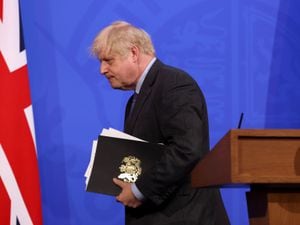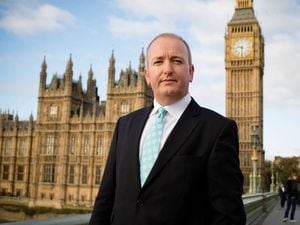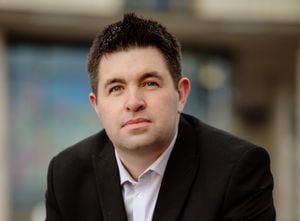Resigned acceptance in Shropshire at lockdown loosening U-turn
Criticism has been heaped on the government over weekend leaks and a failure to close the border quickly enough as the Prime Minister confirmed that restrictions are being extended in England.

In a televised address to the nation from Downing Street, Boris Johnson said the roadmap easing earmarked for June 21 would be delayed for four weeks to July 19.
It means that limits on numbers for sports events, pubs and cinemas will remain in place, nightclubs will stay closed and people will be encouraged to keep up social distancing and working from home.
Shrewsbury nightclub boss Martin Monahan said the leaking of the plans caused anxiety among people working in the industry, and that a strong financial package needs to be forthcoming to help businesses survive.
And Telford & Wrekin’s Labour council leader Shaun Davies was critical over how slowly the border with India was closed.
While the PM’s announcement was generally met with a degree of resigned acceptance, including support from Shropshire’s Tory MPs, a number of Conservative MPs have expressed frustration, prompting the possibility of a backbench rebellion when the delay goes before the Commons for a vote.
Wrekin MP Mark Pritchard said: “This will come as a bitter blow to many businesses around the county.
“I hope any delay will be short and some business exemptions might apply. However, a third wave would have cost many more lives and livelihoods. It’s a very tough decision for the PM, but failing to act now could make things even worse.”

Shrewsbury MP Daniel Kawczynski, speaking on the day he had to apologise in the Commons, added: “The Prime Minister has to take into consideration a significant increase in certain variants.
“I think the silent majority are prepared to support the Prime Minister if he deems it appropriate to extend the restrictions.”
Telford & Wrekin Council’s Shaun Davies said: “I think it’s a blow. It goes against the Government’s plan, but I think it was inevitable when the new Delta variant hit. The data is still quite early in terms of understanding the full picture.
“The government has serious questions to answer in how late they closed the border to India.
“We now need another package of business support, particularly for those in the night time economy and hospitality sectors.
“They also need to realise the impact of office workers not returning back to the office.
“Obviously there are benefits to workers being able to work from home, but there is a huge economic impact from that.
“The government need to consider whether furlough needs to be extended.
“I feel for the self employed people in the night time economy, the singers, the comedians, whose work has been completely stopped overnight.

“The overwhelming majority of people in Telford have complied with the rules and we encourage people to keep doing that, and to get tested when they have symptoms. We need people to keep washing their hands and doing all of those things that are really important.
“For our businesses, it will be another knock to their confidence.”
He also said that vaccine uptake in Telford and Wrekin was high, and encouraged people to keep coming forward for their jabs.
Health minister Edward Argar said that delaying the June 21 lockdown for a month could result in the delivery of another 10 million second coronavirus vaccine doses across the UK.
He said that while the number of people in hospital has been “creeping up a bit”, vaccination meant “we are seeing that severing of the link between the disease and hospitalisations and death.”
Mr Argar added: “I think that on that basis, everyone will recognise that there comes a point where we do have to live with this disease and recognise that you cannot go for a zero Covid approach, you have to live with it, and vaccination is the key to that. So I think once we have got those second doses in people’s arms, once we have got that level of protection up to around that 81 per cent, then I think people will be more comfortable with it.”
Meanwhile, Professor Anthony Harnden, deputy chairman of the Joint Committee on Vaccination and Immunisation (JCVI), said that experts were “still very worried about the small numbers percentage wise, but probably large numbers of people that are still unvaccinated in the higher risk groups”.
He added that the JCVI was “looking carefully at what the Scottish Government has done” with regards to urging over-40s to have their second dose at eight weeks, adding that “it seems to be a sensible strategy, and we will advise the Government accordingly”.
The most recent data, for the seven days up to June 9, showed Shropshire’s infection rate had gone up from 7.7 per 100,000 people to 22.3, while in Telford and Wrekin, numbers went up from 42.3 to 52.8 within a week.
The move to delay lockdown has come as a huge setback to many businesses – particularly in the hospitality sector – which had pinned its hopes on a full summer reopening to recoup some of the losses of the past year.
Meanwhile, Wales’s economy minister Vaughan Gething said Wales’s lockdown plan was to be guided by “data, not dates” and that the so-called Delta variant meant the Welsh Government had to take a phased approach to lifting restrictions.
Mr Gething said Welsh ministers had no plans to indicate a date for ending measures in Wales.
He told a press briefing in Cardiff: “We have always said that trying to set out commitments to an irreversible road to freedom, an irreversible move in one direction when we know that the pandemic has caused different unpleasant surprises at various points was not something that we thought was sensible.
“So we’ll carry on with the approach we’ve taken here in Wales. We’ve generally been guided by the data and evidence, so data, not dates, and we hope that’ll provide as much certainty as we can for people in Wales.”
There are now 315 cases of the Delta variant identified in Wales, with Public Health Wales also announcing it was now the most common variant in new cases following a rise of 131 cases since Thursday.
The majority of new cases are not connected to international travel and are instead due to person-to-person transmissions in the community, believed to be caused by increased mixing.
Most of the cases in Wales are focused around a cluster in both North and South Wales, but unlinked cases were starting to appear in these areas and elsewhere in Wales.
Mr Gething said the increasing numbers of variant infections meant the Welsh Government had to take a phased approach to lifting restrictions.
“We are relaxing restrictions around outdoor events and activities first because the evidence continues to suggest the risk of infection is significantly lower outdoors compared to indoors,” he said.
“While this is absolutely the right decision for Wales, we recognise the impact it will have on a significant number of businesses, particularly wedding venues and indoor attractions.”
Mr Gething said the Welsh Government would put further funding in place for businesses “materially affected” by the phased move to Alert Level One.
Eligible businesses such as indoor attractions and wedding venues will be entitled to an additional payment of between £875 and £5,000 depending on their “size and circumstances”, he added.
But Mr Gething said any phasing out of current furlough arrangements will cause all businesses to “make choices” such as whether to continue operating.





